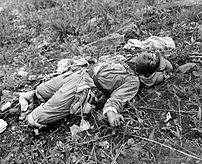All beings tremble before danger, all fear death. When a man considers this, he does not kill or cause to kill.
All beings fear before danger, life is dear to all. When a man considers this, he does not kill or cause to kill.
-The Buddha--Dhammapada 54
Image via Wikipedia
It is strange how humanity has been conditioned to accept the idea that there are only certain acts of war that are criminal. When in fact, the act of war is itself is a crime.
Now some may argue that there are good wars and therefore it is important that we accept the term "war crime" to acknowledge the claim that certain acts of state sponsored killing are needed and other acts are too horrific. They usually point to World War 2 as being a good war because ultimately it brought down that mad man Hitler.
The "good war" argument has been used to justify the killing and maiming of tens of millions of people since World War 2. The good war paradigm has brought us the Cold War, the Korean War, Vietnam, the endless wars south of our border, the Gulf War, the Iraq War, and the War in Afghanistan. The good war argument is also used around the world to justify the mass killing of people for the sake of humanity.
But war is inhumane and that is all there is to it. Now the fact that a government sanctions the killing of millions doesn't make it a good war.
But what about World War 2, wasn't that a necessary war?
In the case of Germany, the war didn't just spring from a mad man's mind. But it had it roots in another event of economic "disaster capitalism" called the Great Depression and a punitive Treaty of Versailles leveled against the Germans by the Allied powers. It is not too surprising that a suffering German people would lose their heads and abandon humane principles in an effort to find a solution. Still Hitler never had more than 37% of support among the German people in honest elections. The real support that Hitler had came from corporations in Germany and around the world. Germany was a monster created from disaster capitalism and the leaders of that system. When we look at the rise of fascism in Italy we see similar forces at work.
But what about the Japanese and their attack on Pearl Harbor?
Japan was a colonial power and that was something it learned from Europe. Still, even after a US steel and oil embargo that was crippling the island:
.... Prime Minister Konoye called in Ambassador Joseph Grew and secretly offered to meet FDR in Juneau or anywhere in the Pacific. According to Grew, Konoye was willing to give up Indochina and China, except a buffer region in the north to protect her from Stalin, in return for the U.S. brokering a peace with China and opening up the oil pipeline. Konoye told Grew that Emperor Hirohito knew of his initiative and was ready to give the order for Japan's retreat.
Fearful of a "second Munich," America spurned the offer. Konoye fell from power and was replaced by Hideki Tojo. Still, war was not inevitable. U.S. diplomats prepared to offer Japan a "modus vivendi." If Japan withdrew from southern Indochina, the United States would partially lift the oil embargo. But Chiang Kai-shek became "hysterical," and his American adviser, one Owen Lattimore, intervened to abort the proposal....From t he American Cause, Founder Patrick Buchanon
As we can see, if we decide to look with open eyes, wars don't just arise from nothing or even the mind of a mad man. Even if we examine supposedly good wars, we see that they arise from acts of injustice, dehumanization, and intransigence from all sides. Wars have roots and if we were to strike at the roots we could avoid even supposedly "good wars."
The truth about war is much as the Nazi General Hermann Goering declared it.





